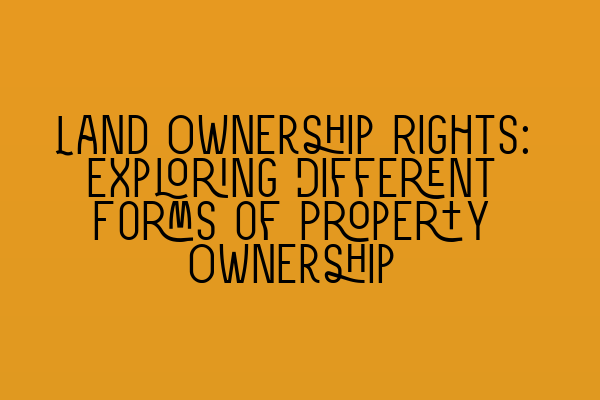Land Ownership Rights: Exploring Different Forms of Property Ownership
When it comes to land ownership, there are various forms of property ownership that individuals can hold. Understanding these different forms is crucial, as it affects the rights and responsibilities one has over the land. In this article, we will explore the various types of land ownership and shed light on their key features.
1. Freehold Ownership
Freehold ownership is the most common form of land ownership. When you own a property as a freehold, you have absolute ownership rights over the land and the buildings on it. This means that you have complete control over the property and can use, modify, or dispose of it as you see fit, subject to any legal restrictions and planning regulations. Freehold ownership is typically long-term or indefinite, allowing you or your heirs to have perpetual ownership.
If you are planning to buy a property and want to secure your freehold ownership, it is crucial to conduct thorough due diligence. Working with a reliable property solicitor can help ensure that the property is free from any legal encumbrances or disputes that may affect your ownership rights. SQE Property Law & Land Law offers expert legal services to assist you in this process. Click here to learn more about our SQE 1 Practice Exam Questions.
2. Leasehold Ownership
Leasehold ownership is when you own a property for a fixed period of time, known as the lease term, but not the land it is built on. Typically, leasehold ownership is common in the case of flats and apartments, where multiple units share the same land. As a leaseholder, you have certain rights and responsibilities as outlined in the lease agreement. These may include paying ground rent, service charges, and obtaining consent for certain modifications or transfers.
It’s important to understand the terms and conditions set out in the lease agreement before purchasing a leasehold property. Consulting a knowledgeable property solicitor can help you navigate the complexities of leasehold ownership and ensure that you are fully aware of your rights and obligations. SQE Property Law & Land Law offers comprehensive legal advice to leaseholders. Learn more about our SQE 1 Practice Mocks FLK1 FLK2 to enhance your understanding of leasehold ownership.
3. Commonhold Ownership
Commonhold ownership is a relatively newer form of property ownership that was introduced in England and Wales in 2004. It allows for the collective ownership of common parts, such as communal areas, in a multi-occupancy building. Each unit owner in the building becomes a member of the commonhold association, granting them a stake in the management and decision-making processes.
Commonhold ownership offers a more democratic approach to property ownership, where each owner has a say in how the common areas are managed. However, this form of ownership is less common compared to freehold or leasehold, and some lenders may have restrictions on providing mortgages for commonhold properties.
Before considering commonhold ownership, it is essential to seek legal advice to understand the specific implications and requirements. SQE Property Law & Land Law can assist you in navigating the intricacies of commonhold ownership and ensure a smooth transaction. Check out our SQE 2 Preparation Courses to expand your knowledge in property law.
4. Joint Ownership
Joint ownership, also known as co-ownership, is when two or more individuals jointly own a property. There are two primary forms of joint ownership: joint tenancy and tenancy in common. In joint tenancy, each co-owner has an equal share in the property, and if one co-owner dies, their share automatically passes to the surviving co-owners. In tenancy in common, each co-owner can hold unequal shares, and their shares can be transferred or inherited according to their wishes.
When entering into joint ownership, it is recommended to establish clear terms and conditions through a legally binding agreement, such as a Declaration of Trust. This document outlines each owner’s rights, responsibilities, and procedures for dispute resolution. Seeking professional legal advice from SQE Property Law & Land Law can help ensure that your joint ownership arrangement is properly established and protected.
In Conclusion
Understanding the different forms of property ownership is crucial for anyone involved in the real estate market. Whether you are a buyer, seller, or investor, knowing your rights and responsibilities can help you make informed decisions and protect your interests. Whether you are interested in freehold, leasehold, commonhold, or joint ownership, be sure to consult with a reputable property solicitor like SQE Property Law & Land Law.
For assistance with property law matters, including advice on property ownership rights, contact SQE Property Law & Land Law today. Don’t forget to check out our SQE 1 Preparation Courses to enhance your understanding of property law concepts, and stay updated with the latest SRA SQE Exam Dates.
